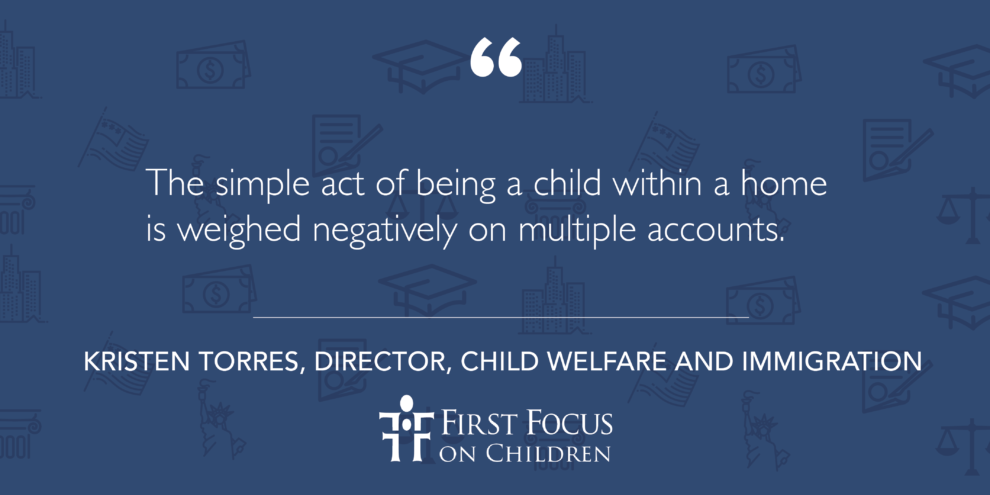
The Trump administration has finalized a rule that will expand the definition of a public charge when determining eligibility for individuals applying for admission to the U.S. or for adjustment of status to that of lawful permanent resident (green card). This expansion will allow for the consideration of an applicant’s use of services such as Medicaid, the Supplemental Nutrition Assistance Program (SNAP), Federal, State and local cash assistance programs such as Temporary Assistance for Needy Families (TANF) and subsidized housing vouchers. To make this determination, DHS will look at the “totality of a person’s circumstances” including their age, health, assets, education, and financial status. A person may be deemed a public charge if he/she has used one or more public benefits for more than 12 months in the aggregate within any 36-month period (receipt of 2 benefits will count as 2 months). The rule is expected to go into effect on October 15, 2019.
The final rule included some changes from the proposed regulation. For instance, Medicaid will not be considered for those under the age of 21 and pregnant women through 60 days after giving birth. Additionally, the Children’s Health Insurance Program (CHIP), Headstart, WIC (Nutrition program for Women, Infants and Children), and Low-Income Home Energy Assistance Program (LIHEAP) will not be included in the list of services considered for a public charge determination. But the regulation directly targets family-based immigration and specifically singles out children. Here are some of the ways in which it will impact children.
Children are not exempt from the rule.
While there is a list of certain groups who are exempt from the public charge determination including victims of severe forms of trafficking or criminal activity (T and U-Visas), refugees and asylum applicants, Special Immigrant Juveniles, and others,[1] children are not exclusively exempt. In the rule, DHS recognizes that children are not making decisions to apply for benefits themselves, yet they make no exemption for those who fall under a head of household. Alarmingly, they go out of their way to argue that there is no need for a child to have the capacity to understand the consequences of these actions. While children are specifically exempt from Medicaid, other benefits such as the Supplemental Nutrition Assistance Program (SNAP) or federal, state and local cash assistance programs such as Temporary Assistance for Needy Families (TANF) will be used against children seeking when adjustment of immigration status.
Children are considered negative factors both for themselves and for the consideration of their parents in the totality of circumstances
The rule states that it will consider an age of less than 18 as a negative factor, as under 18 they are unable to be meaningfully employed. Additionally, household size will be viewed as a negative unless the household members are contributing to the household income. While the rule states it will not include the use of benefits by U.S. citizen children within the household, DHS may still count the U.S. citizen child as a negative factor in the totality of circumstances for the parent’s application. Therefore, the simple act of being a child within a home is weighed negatively on multiple accounts.
MILLIONS of children will lose access to health care, housing and nutrition services
While there are exclusions in Medicaid specifically for children, it is likely that the parents of these children will choose to forego health care coverage and services to avoid negative immigration consequences. According to a report by the Kaiser Family Foundation approximately 8 million children enrolled in CHIP and Medicaid live in a household with at least one noncitizen and may be at risk for disenrollment.[2] Research shows that when parents don’t have health insurance, their children are less likely to have health care coverage or seek health care services.[3]
When it comes to housing assistance, there is no way to separate benefits to parents and their children who live in the same home. You cannot divide up a home or an apartment based on who is eligible for assistance, so when parents lose assistance and housing becomes unaffordable, the entire family, including children, is put at risk of homelessness. In writing the rule, the Administration noted that it expects to see “Increased rates of poverty and housing instability…”
The rule threatens children’s access to food both at home and at school. Parents and children may disenroll from SNAP in order to avoid a public charge determination as approximately 3.4 million citizen kids who access SNAP[4] live with at least one non-citizen family member. Even if eligible children remain on the program, when parents drop out this means less food in the house. Additionally, kids enrolled in SNAP automatically receive free school meals. Once they forfeit SNAP enrollment, they would not have that automatic follow-through. They are unlikely to apply for free meals at school because of a host of issues including, language barriers, lack of enrollment information, and fear of negative immigration outcomes.
The impact will reach beyond the intended targets
Beyond those families directly subject to the rule, expanding the public charge determination will have a broad chilling effect and will deter all immigrant households from accessing any essential services out of fear it will negatively impact their immigration status. Parents may choose to also give up benefits not covered out of general fear of repercussions and an increase in distrust of government services. We have already seen the chilling effect responsible for a 10 percent decline in SNAP participation during the first half of 2018 by eligible families.
The rule disproportionately affects family-based immigration.
The public charge rule is a direct attempt to cut family-based immigration. In 2016, approximately 68 percent of the total persons who obtained Legal Permanent Resident (LPR) status were immediate relatives of U.S. citizens or had a family-based sponsor.[5] The rule would make it more difficult for families to stay together or reunify, as families both in the U.S. and abroad will be forced to meet the new requirements for a wide range of demands.
The
Administration is knowingly subjecting children to these hardships. They acknowledge
in the rule that children and other vulnerable populations will be impacted. It
specifically states that disenrollment from public programs will result in
declining child health, increased poverty and homelessness, reduced
productivity and educational attainment.
[1] https://www.uscis.gov/greencard/public-charge
[2] https://www.kff.org/disparities-policy/fact-sheet/public-charge-policies-for-immigrants-implications-for-health-coverage/
[3] http://hrms.urban.org/quicktakes/health-insurance-coverage-children-parents-march-2017.html
[4] https://fns-prod.azureedge.net/sites/default/files/ops/Characteristics2016.pdf
[5] https://www.dhs.gov/immigration-statistics/yearbook/2016/table6
